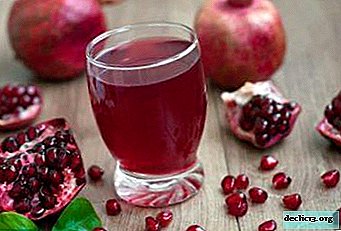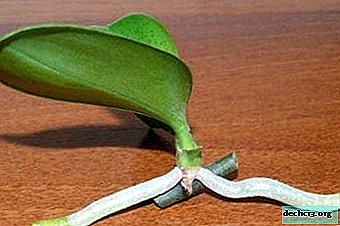The benefits and harms of pomegranate juice for pregnant women - is it possible to drink a drink? Cooking and Selection Tips

Expecting a child is a pleasant, but also an exciting stage in the life of a woman. When you need to think not only about your health, but about the proper development of the baby inside. Therefore, due attention is paid to the nutrition of the expectant mother.
The easiest and cheapest way to enrich the diet with vitamins is the use of natural juices.
The leader in the content of nutrients is pomegranate juice.
Can I drink during pregnancy?
There is an opinion that the body itself knows what nutrients it needs at the moment for proper functioning. Therefore, various taste preferences appear. During pregnancy, all sensations are aggravated, so women have an irresistible desire in a particular product.
Pomegranate juice is enjoyed by women on demolitions. The product is absolutely harmless if there are no individual contraindications. It positively affects the work of the digestive tract, relieves nausea and improves the general condition.
Important! Pomegranate juice helps fight anemia. Future mothers are often diagnosed with a decrease in hemoglobin as a result of a sharp increase in blood volume in the body.But then I want to make a note: in some cases, this product can harm. This is possible if a woman suffers from diseases of the organs of the gastrointestinal tract, chooses or consumes juice incorrectly.
What is this drink good for?
The first benefit of pomegranate juice is that it is a full-fledged source of vitamins: A, B1, B2, B6, E, PP. It contains a large number of minerals:
 potassium;
potassium;- calcium;
- magnesium;
- selenium;
- iron;
- iodine;
- phosphorus.
Also the product is rich in:
- fiber;
- pectins;
- amino acids;
- carbohydrates;
- proteins;
- and a little fat.
- Due to the presence of antioxidants and isoflavones, the drink has antiseptic, anti-inflammatory and antipyretic properties.
- Its systematic use has a positive effect on the cardiovascular system of a pregnant woman.
- The liquid from the fruit of the pomegranate tree is involved in increasing immunity, eliminating the loss of strength and bad mood.
- Juice helps with frequent attacks of toxicosis in the first trimester of pregnancy.
- Fiber helps to eliminate toxins and toxins.
- Often the process of bearing a child is accompanied by swelling. Fruit juice has a diuretic effect, and with regular use, you can completely forget about this problem.
- Even therapists recommend using this product for the prevention of colds, acute respiratory viral infections, which is equally important at the time of pregnancy.
- Pomegranate juice is no less useful for the skin, it is used as a bleach. Since pigment spots in expectant mothers are a natural phenomenon, daily rubbing of the face will help reduce the size of pigmentation or completely eliminate it.
Indications and contraindications
Indeed, pomegranate juice is a healthy product, and directly during pregnancy has specific advantages:
- stimulates appetite;
- suppresses bouts of nausea;
- increases the body's resistance to infectious diseases;
- strengthens the circulatory system;
- increases the level of hemoglobin in the blood;
- improves blood coagulation;
- has a calming effect on the nervous system;
- removes excess fluid from the body;
- positive effect on the heart;
- normalizes blood pressure;
- promotes proper metabolism;
- compensates for the deficiency of minerals and vitamins.
However, with the undeniable benefits and usefulness of juice, there is still harm from it, therefore There are a number of contraindications:
 In the presence of a large amount of acid in the composition of freshly squeezed juice, it has a significant effect on the digestive system. Perhaps the appearance of heartburn, increased acidity in a pregnant woman. For the same reason, tooth enamel suffers.
In the presence of a large amount of acid in the composition of freshly squeezed juice, it has a significant effect on the digestive system. Perhaps the appearance of heartburn, increased acidity in a pregnant woman. For the same reason, tooth enamel suffers.- During the period of carrying a child, a woman is advised to add products to the diet, after having tried a small amount of them, thus making sure that there is no allergic reaction. When symptoms appear, be sure to exclude.
- The tannins found in the fruit fluid exert astringent properties. With frequent use, constipation in a woman may occur.
- In the early stages of pregnancy, the product is prohibited if there is a threat of miscarriage. Juice promotes the production of the hormone oxytocin, which causes uterine contractions and stimulates preterm labor.
In this way, pomegranate juice is not recommended if there is:
- gastritis;
- pancreatitis
- increased acidity;
- peptic ulcer disease;
- individual intolerance;
- risk of miscarriage;
- chronic constipation.
How to use?
The use of this drink should be treated with caution so as not to harm the baby and your body. In this regard, there is some tips for use:
 It is advisable to drink through a tube so as not to harm the enamel.
It is advisable to drink through a tube so as not to harm the enamel.- After drinking, be sure to rinse your mouth with water at room temperature, neither cold nor hot.
- Drink exclusively in diluted form. Concentrated juice is best diluted with boiled water or other juices, for example, carrot, beetroot, apple. To breed in proportions 1: 1.
What will happen if taken every day?
It is not advisable that the use of a healthy drink exceeds the daily norm. Doctors advise drinking a concentrated fruit product and not more than three glasses a day. You need to start with one glass, and then gradually increase the amount. It is preferable to drink freshly squeezed juice 3 times a day for half an hour before meals 3-4 days a week.
How to cook?
Beneficial substances are maximally stored in freshly squeezed pomegranate juice for the first 20 minutes after cooking, and after this time, the concentration decreases by 40%.
At home, pomegranate juice can be prepared by the following methods.
- Using a household juicer or citrus press.
- Wipe through a sieve. First, clean the pomegranate and remove the septum, squeeze the juice, then drain through cheesecloth. The method is quite laborious.
- Roll the fruit on a hard surface for several minutes, then tightly squeeze in the hand. Squeeze out the liquid from the destroyed grains through the hole made in the peel.
Can I buy in a store?
All the previously described beneficial qualities are inherent only in freshly squeezed pomegranate juice. Unfortunately, not everyone has the opportunity to prepare a healthy drink daily, then it is worth contacting specialized points of sale of fresh juices. If this option does not work, bottled store juice remains.
How to choose?
Before buying, you need to pay attention to the following nuances:
 The finished product should be in a glass container.
The finished product should be in a glass container.- Shelf life - up to 6 months, but in general, the less the better.
- Juice of the first extraction.
- Inspect the contents, sediment may be present, which indicates the naturalness of the product.
- The manufacturer is preferably Azerbaijan, it is there that it is manufactured in industry in large quantities.
- High price. Inexpensive juice can be if sold in the country of manufacture.
So, pomegranate juice can rightfully be called a healing drink. But, pregnant women need to drink it strictly in fresh form. And it is advisable immediately after preparation, otherwise you can’t get the expected result, all vitamins and minerals will disappear.

 potassium;
potassium; In the presence of a large amount of acid in the composition of freshly squeezed juice, it has a significant effect on the digestive system. Perhaps the appearance of heartburn, increased acidity in a pregnant woman. For the same reason, tooth enamel suffers.
In the presence of a large amount of acid in the composition of freshly squeezed juice, it has a significant effect on the digestive system. Perhaps the appearance of heartburn, increased acidity in a pregnant woman. For the same reason, tooth enamel suffers. It is advisable to drink through a tube so as not to harm the enamel.
It is advisable to drink through a tube so as not to harm the enamel. The finished product should be in a glass container.
The finished product should be in a glass container.















